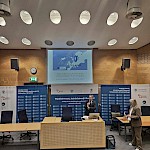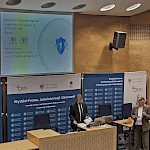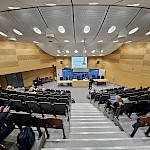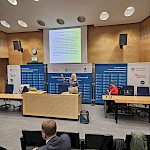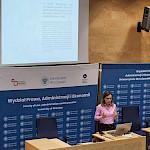2nd International Conference
The concluding conference of the DIGI-GUARD project, titled "Computerization of Civil Procedure in the European Union," took place on October 3-4, 2024, at the Faculty of Law, Administration, and Economics at the University of Wroclaw, Poland. The event commenced with keynote addresses by professors Marek Świerczyński and Remigijus Jokubauskas, who discussed comprehensive guidelines on electronic evidence in civil and administrative cases. Following these initial speeches, Eric Bylander and Marie Linton provided a detailed introduction on critical legal remedy terms, periods, and deadlines, setting a solid foundation for subsequent discussions.
The agenda was systematically structured into several thematic panels that thoroughly addressed key aspects of digitizing civil procedural law. Panel I focused extensively on the electronic service of court documents, highlighting both domestic implementations within Polish law and international perspectives under EU regulations. Prominent speakers such as dr Anna Zalesińska and dr Maria Dymitruk examined current practices and potential improvements in electronic document service, alongside mgr Monika Janus and mgr Joanna Szumańska, who delved into enforcement proceedings and cross-border electronic service within the EU context, respectively.
Panel II addressed remote judicial proceedings, emphasizing challenges and developments related to digital courtroom accessibility and transparency. Professor Jacek Gołaczyński and dr Aleksandra Fruk elaborated on Polish regulations and their practical implications, particularly considering the crucial principle of openness of proceedings. Panel III examined electronic filing of pleadings, where experts including mgr Krystyna Rogala, prof. Ivana Kunda, and Danijela Vrbljanac shared insights into submission procedures, electronic identification, digital signatures, and electronic submissions specifically within enforcement proceedings.
The final panel, Panel IV, revolved around sophisticated issues concerning electronic evidence in civil litigation. Contributors like Darius Bolzanas discussed EU private international law evidence frameworks, while professors Kinga Flaga-Gieruszyńska and Aleksandra Klich examined the evidentiary significance of digital platforms such as websites and internet portals. Additionally, dr Rafał Prabucki shed light on the complexities surrounding metadata as evidence, and prof. Joanna Studzińska detailed methods and legal considerations for remote evidence collection under Polish and European legislation.
The second day of the conference was marked by a highly interactive and productive round-table session dedicated explicitly to the Digi Guard project's achievements and future outlook. Participants actively engaged in discussions aimed at identifying collaborative opportunities, regulatory adjustments, and technological advancements needed to enhance digital implementation further. The conference successfully created a platform for rigorous academic dialogue, fostering partnerships among scholars, legal practitioners, technology experts, and policy-makers, thus significantly advancing the digitization and modernization of civil procedure in the European Union.

Picture: Funded by the European Union
- DIGI - GUARD
- Role of Faculty of Law
- Expert Meetings
- International Conferences
- 1st International Conference
- 2nd International Conference
- Results
- Gallery
- Diversity of Enforcement Titles in cross-border Debt Collection in EU
- Train to Enforce
- Remedies concerning Enforcement of Foreign Judgements according to Brussels I Recast
- LAWtrain
- Developments and trend in the regulation of the attorney's profession with the emphasis on Slovenia and Germany
- Civil vs "Common Law" – the assessment of »rules« of evidence law (testing the admissibility of electronic evidence in common law and continental law systems)
- Dimensions of Evidence in European Civil Procedure
- Simplification of Debt Collection in the EU
- European Enforcement Order
- Medicine, Law and Society
- CRP Service
